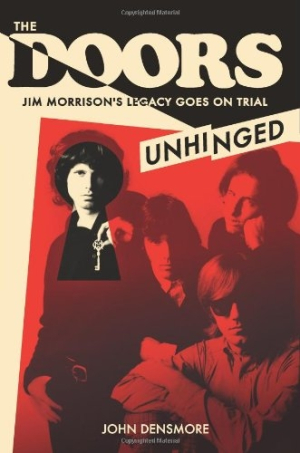The Doors Unhinged
Jim Morrison's Legacy Goes on Trial
A highly charged look at what happens when high ideals and big money collide after the death of a rock icon.
One of rock’s most classic bands of all time, The Doors, have maintained relevance for more than forty years. In The Doors Unhinged: Jim Morrison’s Legacy Goes On Trial, The Doors’ drummer, John Densmore, recounts his extensive (and expensive) legal battles to preserve that legacy.
In 2004, Densmore sued his former bandmates, keyboardist Ray Manzarek and guitarist Robby Kreiger, after the two musicians used the band’s name prominently in advertising for their tour. Densmore claims “the Doors are no more,” without Jim Morrison, and, after failed efforts to compromise, he brought suit against the two men to force them to stop presenting themselves as a modern-day Doors.
Densmore previously published Riders on the Storm, a well-regarded biography that told the story of his relationship with Jim Morrison and The Doors. In this, his second book, he takes the reader from the first day of the trial to its hard-fought conclusion.
The Doors Unhinged is a fascinating narrative about ethics and morals, and where to draw the line on commercialism. Densmore, of course, is fairly confident in his stance, harking back to the early days of The Doors, when it was decided that all members would have an equal say, with veto power. In fact, Morrison used that veto power to nix licensing a song to Buick for a TV commercial after the other three members had approved it.
Years later, it was Densmore who vetoed an extremely lucrative offer from Cadillac, over the protests of Manzarek and Kreiger. Densmore is eloquent in stating his position: He does not wish to see the Doors name marginalized. Manzarek counters that, aside from the money involved, exposure to a new generation of listeners would only enhance the band’s legacy. Densmore references the policies of other musicians on such issues—Tom Petty, Pete Townshend, Bob Dylan, and others—and the reader soon realizes that there are many justifiable positions on this spectrum.
Speaking to Manzarek about the importance of not tarnishing The Doors’ legacy, Densmore quotes himself as saying, “Many kids have said to me that ‘Light My Fire,’ for example, was playing when they first made love, or were fighting in Nam, or got high—pivotal moments in their lives.”
Densmore is sympathetic throughout, but the book is a business ethics case study, with countless “decision points” along the way and endless speculations to be made. The trial setting gives the book the drama of a legal thriller, and Densmore’s writing is top notch, as he expertly weaves relevant anecdotes into the long tapestry of legal process. The Doors Unhinged is a highly charged look at what happens when high ideals and big money collide.
Reviewed by
Peter Dabbene
Disclosure: This article is not an endorsement, but a review. The publisher of this book provided free copies of the book to have their book reviewed by a professional reviewer. No fee was paid by the publisher for this review. Foreword Reviews only recommends books that we love. Foreword Magazine, Inc. is disclosing this in accordance with the Federal Trade Commission’s 16 CFR, Part 255.

